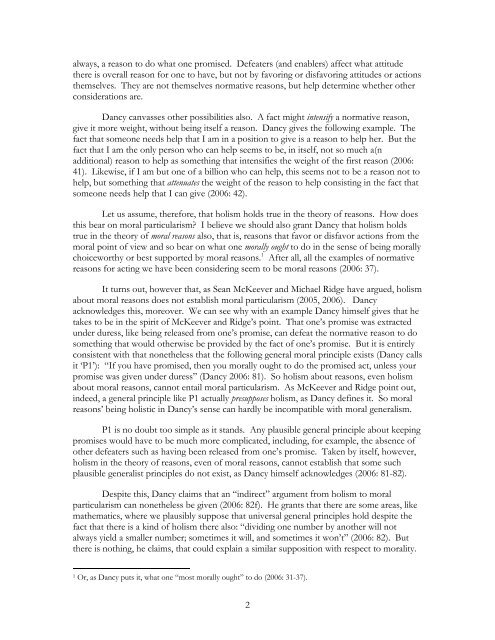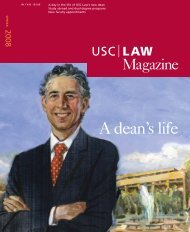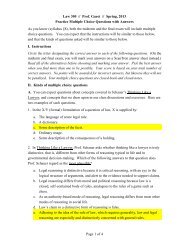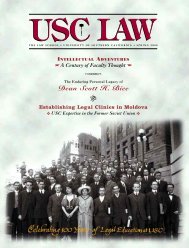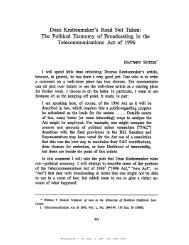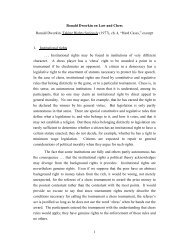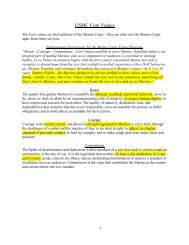1 MORALITY AND PRINCIPLE Jonathan Dancy is largely ...
1 MORALITY AND PRINCIPLE Jonathan Dancy is largely ...
1 MORALITY AND PRINCIPLE Jonathan Dancy is largely ...
Create successful ePaper yourself
Turn your PDF publications into a flip-book with our unique Google optimized e-Paper software.
always, a reason to do what one prom<strong>is</strong>ed. Defeaters (and enablers) affect what attitudethere <strong>is</strong> overall reason for one to have, but not by favoring or d<strong>is</strong>favoring attitudes or actionsthemselves. They are not themselves normative reasons, but help determine whether otherconsiderations are.<strong>Dancy</strong> canvasses other possibilities also. A fact might intensify a normative reason,give it more weight, without being itself a reason. <strong>Dancy</strong> gives the following example. Thefact that someone needs help that I am in a position to give <strong>is</strong> a reason to help her. But thefact that I am the only person who can help seems to be, in itself, not so much a(nadditional) reason to help as something that intensifies the weight of the first reason (2006:41). Likew<strong>is</strong>e, if I am but one of a billion who can help, th<strong>is</strong> seems not to be a reason not tohelp, but something that attenuates the weight of the reason to help cons<strong>is</strong>ting in the fact thatsomeone needs help that I can give (2006: 42).Let us assume, therefore, that hol<strong>is</strong>m holds true in the theory of reasons. How doesth<strong>is</strong> bear on moral particular<strong>is</strong>m? I believe we should also grant <strong>Dancy</strong> that hol<strong>is</strong>m holdstrue in the theory of moral reasons also, that <strong>is</strong>, reasons that favor or d<strong>is</strong>favor actions from themoral point of view and so bear on what one morally ought to do in the sense of being morallychoiceworthy or best supported by moral reasons. 1 After all, all the examples of normativereasons for acting we have been considering seem to be moral reasons (2006: 37).It turns out, however that, as Sean McKeever and Michael Ridge have argued, hol<strong>is</strong>mabout moral reasons does not establ<strong>is</strong>h moral particular<strong>is</strong>m (2005, 2006). <strong>Dancy</strong>acknowledges th<strong>is</strong>, moreover. We can see why with an example <strong>Dancy</strong> himself gives that hetakes to be in the spirit of McKeever and Ridge’s point. That one’s prom<strong>is</strong>e was extractedunder duress, like being released from one’s prom<strong>is</strong>e, can defeat the normative reason to dosomething that would otherw<strong>is</strong>e be provided by the fact of one’s prom<strong>is</strong>e. But it <strong>is</strong> entirelycons<strong>is</strong>tent with that nonetheless that the following general moral principle ex<strong>is</strong>ts (<strong>Dancy</strong> callsit ‘P1’): “If you have prom<strong>is</strong>ed, then you morally ought to do the prom<strong>is</strong>ed act, unless yourprom<strong>is</strong>e was given under duress” (<strong>Dancy</strong> 2006: 81). So hol<strong>is</strong>m about reasons, even hol<strong>is</strong>mabout moral reasons, cannot entail moral particular<strong>is</strong>m. As McKeever and Ridge point out,indeed, a general principle like P1 actually presupposes hol<strong>is</strong>m, as <strong>Dancy</strong> defines it. So moralreasons’ being hol<strong>is</strong>tic in <strong>Dancy</strong>’s sense can hardly be incompatible with moral general<strong>is</strong>m.P1 <strong>is</strong> no doubt too simple as it stands. Any plausible general principle about keepingprom<strong>is</strong>es would have to be much more complicated, including, for example, the absence ofother defeaters such as having been released from one’s prom<strong>is</strong>e. Taken by itself, however,hol<strong>is</strong>m in the theory of reasons, even of moral reasons, cannot establ<strong>is</strong>h that some suchplausible general<strong>is</strong>t principles do not ex<strong>is</strong>t, as <strong>Dancy</strong> himself acknowledges (2006: 81-82).Despite th<strong>is</strong>, <strong>Dancy</strong> claims that an “indirect” argument from hol<strong>is</strong>m to moralparticular<strong>is</strong>m can nonetheless be given (2006: 82f). He grants that there are some areas, likemathematics, where we plausibly suppose that universal general principles hold despite thefact that there <strong>is</strong> a kind of hol<strong>is</strong>m there also: “dividing one number by another will notalways yield a smaller number; sometimes it will, and sometimes it won’t” (2006: 82). Butthere <strong>is</strong> nothing, he claims, that could explain a similar supposition with respect to morality.1 Or, as <strong>Dancy</strong> puts it, what one “most morally ought” to do (2006: 31-37).2


